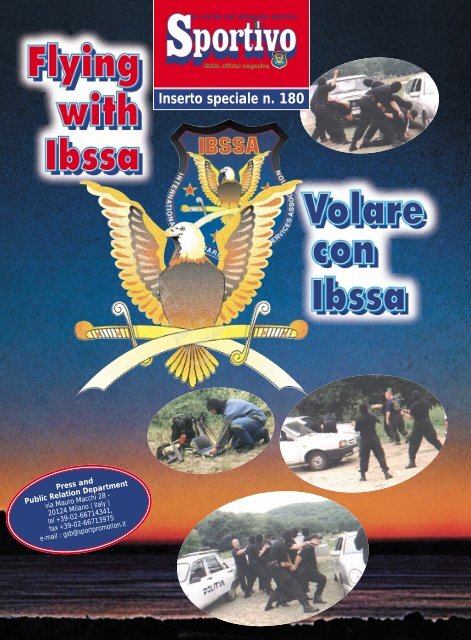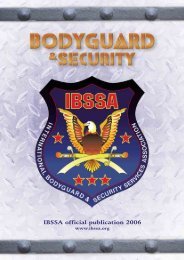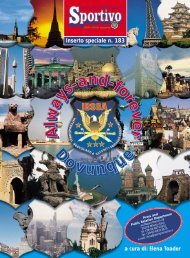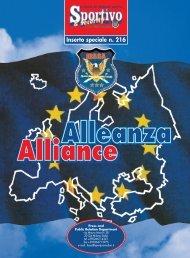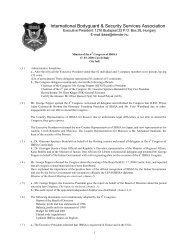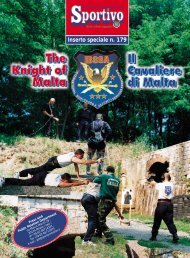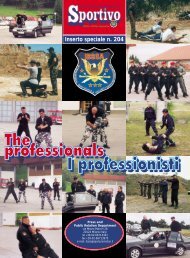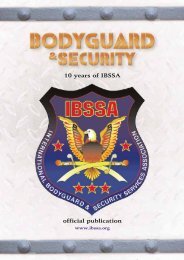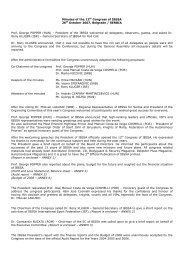Sportivo September 2000
Sportivo September 2000
Sportivo September 2000
Create successful ePaper yourself
Turn your PDF publications into a flip-book with our unique Google optimized e-Paper software.
La rivista del dirigente sportivo<br />
IBSSA official magazine<br />
Inserto speciale n. 180<br />
Press and<br />
Public Relation Department<br />
via Mauro Macchi 28 -<br />
20124 Milano ( Italy )<br />
tel +39-02-66714341,<br />
fax +39-02-66713975<br />
e-mail : gsb@sportpromotion.it
La rivista del dirigente sportivo<br />
IBSSA official magazine<br />
28 <strong>Sportivo</strong><br />
Statute<br />
International<br />
Bodyguard<br />
and Security<br />
Services<br />
Association<br />
In 1994, regulated by the French<br />
Parliament act of 01.07.1901, amended<br />
and unified by the resolution of<br />
16.08.1901, born the IBSSA association.<br />
• Nomination<br />
*In English: International Bodyguard<br />
and Security Services Association (IBS-<br />
SA).<br />
*In French: International Bodyguard<br />
Sécurite Service Association (IBSSA).<br />
• Task, designation and authority<br />
Directed and administered worldwide<br />
all forms of the training of Bodyguards<br />
and security services. The IBSSA is not<br />
a political Body/Association, and<br />
rejects all kind of discrimination.<br />
• Legal position<br />
Non-governmental, non-profit international<br />
organization and legal entity established<br />
for unlimited period.<br />
• Headquarters<br />
* Mr. George Popper - Executive<br />
President (1122 Goldmark K. u. 35<br />
Budapest, Hungary)<br />
*Dr. Rony Kluger - General Secretary<br />
(11 Mizrachi Street 49501 Petach<br />
Tiqua, Israel)<br />
Any transfer possible by the decision of<br />
the Board of Directors of IBSSA only.<br />
• Aims/purposes<br />
The mission of the IBSSA is to train and<br />
educate worldwide their operating<br />
members (or possible members) in the<br />
security and bodyguard sphere, and at<br />
the same time active and decisive participation<br />
in the international bodyguard<br />
activity.<br />
• The IBSSA makes every effort<br />
worldwide to<br />
Encourage/promote the good relationship<br />
between the member organizations<br />
and the persons involved.<br />
Defend/protect the interests of the<br />
Bodyguards working/operating in the<br />
profession.<br />
Organize training courses and introduce/generalize<br />
new techniques in order<br />
to develop and reinforce the standards<br />
of the Bodyguard and security sphere.<br />
• Official languages<br />
The official languages of the IBSSA are<br />
*English<br />
*French<br />
In case of differences, the authentic<br />
Statuto<br />
International<br />
Bodyguard<br />
and Security<br />
Services<br />
Association<br />
Nel 1994, sulla base della legge del<br />
Parlamento francese dell’1.7.1901, rivista<br />
il 16.8.1901, nasce l’associazione<br />
Ibssa.<br />
• Nome<br />
* In inglese: International Bodyguard<br />
and Security Services Association<br />
(Ibssa)<br />
* In francese: Internationale Bodyguard<br />
et Sécurite Service Association (Ibssa)<br />
• Scopi<br />
Dirige e amministra in tutto il mondo tutte<br />
le forme di preparazione per le<br />
Guardie del Corpo e Servizi di<br />
Sicurezza. L’Ibssa è un’associazione<br />
apolitica e non ammette nessun tipo di<br />
discriminazione.<br />
From the left: the IBSSA<br />
Honorary President H.R.H.<br />
Adan Czartorysky Borbon, the<br />
Executive President George<br />
Popper and one of his<br />
bodyguards<br />
English is determinative.<br />
• Determination<br />
All states, countries or territories that<br />
considered by the IBSSA may participate<br />
in the activity of the IBSSA.<br />
• Disputes<br />
The court of arbitration in Paris can determine<br />
finally every debate, which<br />
could not be settled in a peaceful way<br />
and emerges from the interpretation of<br />
the statute.<br />
The parties bone fide undertake and accept<br />
the obligations stipulated in the statute,<br />
and enforce the law.<br />
• Basic principles concerning<br />
the IBSSA membership<br />
All Body, association, society and individuals,<br />
which qualified, can be full member<br />
of the IBSSA.<br />
The admission and exclusion of the IBS-<br />
SA members fall within the competence<br />
of the Board of Directors.<br />
Da sinistra: il presidente<br />
onorario principe Adan<br />
Czartorysky Borbon, il<br />
presidente esecutivo George<br />
Popper e una sua guardia del<br />
corpo<br />
• Posizione legale<br />
Organizzazione internazionale non-governativa,<br />
senza fini di lucro ed entità<br />
legale per un periodo illimitato.<br />
• Sede legale<br />
* George Popper – Presidente esecutivo<br />
(1122 Goldmark K. U.35 Budapest,<br />
Ungheria)<br />
* Rony Kluger – Segretario generale<br />
(11 Mizrachi Street 49501 Petach<br />
Tigua, Israele)<br />
Ogni trasferimento delle sedi legali è<br />
possibile su decisione del Consiglio direttivo.<br />
• Scopi/propositi<br />
La missione dell’Ibssa è di preparare ed<br />
educare in tutto il mondo i suoi associati<br />
operativi (o possibili associati) nel campo<br />
della sicurezza e delle guardie del<br />
corpo e nello stesso tempo svolgere una<br />
partecipazione attiva e decisiva nell’attività<br />
internazionale del settore.<br />
The determination of temporary membership<br />
is also the Board of Directors full<br />
competence.<br />
Every member of the IBSSA is obliged<br />
to fill the requirements/specifications of<br />
the statute.<br />
Those Associations and societies wishing<br />
to join in the IBSSA, without request<br />
must to present full and detailed<br />
information about the activity, nature,<br />
standards and the structure of their company/firm.<br />
• The congress of IBSSA<br />
*There is every year a congress<br />
*Every 5 th year the congress is an electoral<br />
assembly<br />
*The congress is provided valid due<br />
and proper notices is sent to all members<br />
*All members have the right to participate<br />
and vote at the congress<br />
*Individual members have one-vote,<br />
company members have ten-votes<br />
*The congress will only elect the president<br />
and the Board of Directors<br />
• Candidatures validity of congresses<br />
and voting<br />
The representatives of IBSSA member<br />
companies or organizations, individual<br />
members and the founders of IBSSA<br />
who intend to present their candidatures<br />
for one of the IBSSA offices must comply<br />
with the following formalities.<br />
*May stand for one elected position<br />
only<br />
*Must be free of criminal record<br />
*Must be free of any IBSSA suspensions<br />
The Congress shall decide by majority<br />
vote. The voting shall be done generally<br />
by the show of hands or by roll call. For<br />
elections of particular importance or delicacy<br />
or when ever at least half of the<br />
congressman shall demand it, voting<br />
shall be by secret ballot. The president<br />
or in his absence the senior Vice<br />
President shall have a casting vote except<br />
in elections.<br />
In case of the votes being equal the<br />
candidate with longer membership in<br />
IBSSA shall be elected.<br />
• Board of Directors<br />
The corporate leading Board of<br />
Directors of IBSSA shall be consisting<br />
of.<br />
*Executive President and four directors<br />
(Board of Directors)<br />
The Board of Directors shall be directed<br />
the affairs of the IBSSA, and represent<br />
in conform of the statute.<br />
The Executive President and the members<br />
of the Board of Directors may exclusively<br />
be natural persons. The Board<br />
of Directors has the right to make decision<br />
in all cases, which are not under<br />
the legal law, or other organizations statute.<br />
The Executive Presient and members of<br />
the Board of Directors (hereinafter collectively<br />
referred to as: Members of the<br />
Board of Directors) are elected for five<br />
• L’Ibssa fa tutto il possibile nel<br />
mondo per:<br />
Incoraggiare e promuovere le buone relazioni<br />
tra organizzazioni aderenti e le<br />
persone che ne fanno parte.<br />
Difendere e proteggere gli interessi delle<br />
guardie del corpo operanti nel settore.<br />
Organizza corsi di addestramento e introduce/propone<br />
nuove tecniche per<br />
sviluppare e migliorare gli standard delle<br />
guardie del corpo e di coloro che<br />
operano nel campo della sicurezza.<br />
• Lingue ufficiali:<br />
* inglese<br />
* francese<br />
• Intenti<br />
Tutti gli Stati, Paesi o territori che fanno<br />
parte dell’Ibssa devono prendere parte<br />
alle attività proposte.<br />
• Dispute<br />
La corte di arbitraggio è a Parigi e in<br />
quella sede si possono definire eventuali<br />
dispute, che non possono essere risolte<br />
al di là delle norme dello Statuto.<br />
Le parti implicate devono accettare tutto<br />
ciò che viene indicato nello Statuto e secondo<br />
i dettami della legislazione in<br />
materia.<br />
• Principi basilari per diventare<br />
membro Ibssa<br />
Tutte le associazioni, società e individui<br />
qualificati, possono diventare membri<br />
Ibssa.<br />
L’accettazione e l’esclusione dall’Ibssa<br />
vengono decise dal Consiglio direttivo.<br />
La decisione di una membership temporanea<br />
può essere stabilita dal Consiglio<br />
direttivo.<br />
Ogni membro Ibssa è obbligato a rispettare<br />
le norme previste dallo Statuto.<br />
Le associazioni e società che vogliono<br />
diventare membri Ibssa, devono presentare<br />
informazioni dettagliate sulla natura<br />
della loro attività, gli standard e la struttura<br />
societari.<br />
• I Congressi dell’Ibssa<br />
* Ogni anno viene proposto un<br />
Congresso<br />
* Ogni cinque, durante il Congresso,<br />
l’assemblea elettiva<br />
* Le decisioni del Congresso sono demandate<br />
a tutti i membri<br />
* Tutti membri “full member” hanno il diritto<br />
di partecipare e votare ai<br />
Congressi<br />
* Ai membri individuali spetta di diritto<br />
un voto e alle società 10 voti<br />
* Il Congresso vota il presidente e il<br />
Consiglio direttivo<br />
• La validità delle candidature<br />
e le modalità di voto<br />
I rappresentanti delle società o organizzazioni<br />
facenti parte dell’Ibssa, membri<br />
individuali o fondatori, che desiderano<br />
presentare la loro candidatura per uno<br />
dei dipartimenti previsti devono seguire<br />
le seguenti formalità:<br />
* candidarsi per una sola carica<br />
* avere la fedina penale pulita<br />
<strong>Sportivo</strong> 29
La rivista del dirigente sportivo<br />
IBSSA official magazine<br />
30 <strong>Sportivo</strong><br />
years period, and they can be reelected<br />
or removed from their positions at<br />
any time.<br />
Annually the Board of Directors shall<br />
hold his session’s minimum once, but at<br />
the request of the chairman, or the<br />
majority of the Board of Directors could<br />
initiate a session or assembly.<br />
In case of certain reasons the session<br />
could not be held, letter, fax or telegrams<br />
could make the decisions too.<br />
All of the Board of Director’s resolutions<br />
shall be passed by a majority of votes.<br />
In case of an even number of voters cast,<br />
the chairman’s vote is the decisive.<br />
Those Board of Directors sessions considered<br />
valid, where minimum 50% of the<br />
Board of Directors members were participated.<br />
In case of the chairman’s absence, the<br />
vice-chairman leads the session of the<br />
Board of Directors.<br />
• Honorary President and<br />
Honorary Members<br />
The Honorary President and Honorary<br />
Members are appointed by the Board<br />
of Directors upon the proposal of the<br />
Executive President and approved by<br />
the Congress. The selection must be made<br />
from a list of prominent persons operating<br />
for the benefit of security worldwide.<br />
• The Executive President<br />
The Executive President represents IBS-<br />
SA for all purposes and presides over<br />
all the Bodies and Offices, Convenes<br />
the Congresses and meeting of IBSSA.<br />
The Executive President is responsible<br />
for the affairs of IBSSA pursuant to the<br />
Statues.<br />
In case of a temporary absence or impediment,<br />
the Executive President can<br />
delegate functions and powers, entirely<br />
or partially, to one of the IBSSA officers.<br />
• Vice-President<br />
Furthermore the Board of Directors may<br />
appoint and relieve Vice-President from<br />
the active members of the Board of<br />
Directors.<br />
The Vice-President assists the President,<br />
and substitutes him in case of absentia.<br />
• General Secretary<br />
The General Secretary shall be appointed<br />
by the Board of Directors from the<br />
members of the board of directors. He<br />
has to carry out the ordinary tasks of the<br />
General Secretary and keep the communication<br />
with the members generally<br />
and worldwide.<br />
Upon the suggestion of the General<br />
Secretary, the Board of Directors could<br />
appoint a Managing Director who has<br />
no right to vote, but participate in the<br />
sessions of the Board of Directors. His<br />
main task to prepare minutes, summaries<br />
and reports of the activities of the<br />
IBSSA.<br />
For finances the Executive President and<br />
the General Secretary are responsible.<br />
The Executive Committee is composed<br />
of the Board of:<br />
1. The Board of Directors<br />
2. Honorary President<br />
3. Honorary Founding Members<br />
4. Coordinating Presidents of<br />
Continents and other Leadership members<br />
appointed by the Board of<br />
Directors.<br />
• Technical Committee<br />
The technical Committee shall be appointed<br />
and relieved by the chairman.<br />
Its a honorary commission and the purpose<br />
to give advises.<br />
• Basic principal financial conditions<br />
The Executive President and the General<br />
Secretary are responsible for the treasury<br />
of the IBSSA, and for the systematically<br />
and permanent accounting/audit.<br />
The fiscal year is counted from 1 st of<br />
January till 31 st of December.<br />
An indipendent auditor shall be appointed<br />
by the Board of Directors for a fiscal<br />
year to make the necessary international<br />
financial supervision and annual report.<br />
The incoming of the IBSSA originated<br />
from the paid membership-fees, training<br />
courses and any other earnings including<br />
presents, legacy, grants, gifts, and<br />
donations.<br />
• The use of the financial funds<br />
The use of the financial funds can be<br />
covering all expenses of the IBSSA activity<br />
including the current expenses, charges<br />
of the staff and other overhead costs.<br />
• The responsibility of the IBS-<br />
SA towards non-members<br />
The IBSSA in compliance with his obligations<br />
shall undertake his engagements<br />
for any third party. The members<br />
of the Board of Directors in person<br />
could not held responsible for any debt<br />
and liability of the IBSSA.<br />
• General principles<br />
Any modification of the present statute<br />
could be made only with the 2/3 majorities<br />
of the votes.<br />
* non avere nessuna sospensione Ibssa<br />
Il Congresso decide in base alla maggioranza.<br />
I voti vengono conteggiati<br />
con alzata di mano.<br />
Per elezioni di particolare importanza,<br />
delicate o quando si richiede la metà<br />
dei membri presenti, lo scrutinio è segreto.<br />
Il presidente, o in sua assenza il primo<br />
vicepresidente, deve controllare la correttezza<br />
delle votazioni.<br />
Se due candidati ottengono lo stesso<br />
numero di voti, il candidato con la più lunga<br />
permanenza nell’Ibssa verrà eletto.<br />
• Consiglio direttivo<br />
Il Consiglio direttivo Ibssa deve essere<br />
composto da:<br />
* presidente esecutivo e quattro direttori.<br />
Il Consiglio direttivo deve dirigere le attività<br />
dell’Ibssa e la rappresenta in<br />
conformità dello Statuto.<br />
Il presidente esecutivo e i membri del<br />
Consiglio devono essere persone idonee.<br />
Il Consiglio ha il diritto di prendere tutte<br />
le decisioni in tutti i casi necessari ma<br />
che non siano in dissacordo con le leggi<br />
e con lo Statuto Ibssa.<br />
Il presidente esecutivo e i membri del<br />
Consiglio (nominati sempre come membri<br />
del Consiglio direttivo) sono eletti<br />
per un periodo di cinque anni e possono<br />
essere rieletti o sollevati dai loro incarichi<br />
in ogni momento.<br />
Il Consiglio direttivo deve organizzare<br />
una riunione di Consiglio almeno una<br />
volta all’anno e alla richiesta del presidente,<br />
o della maggioranza del<br />
Consiglio, può dare corso a un’assemblea<br />
o a una sessione di lavoro.<br />
Nel caso in cui esistano seri impedimenti<br />
per una sessione le decisioni possono<br />
essere prese tramite lettera, fax o<br />
telegramma.<br />
Nel caso i voti non siano maggioritari il<br />
voto del presidente è decisivo.<br />
Saranno considerate valide le riunioni<br />
di Consiglio con la presenza di almeno<br />
il 50% dei membri del Consiglio direttivo.<br />
In caso dell’assenza del presidente il vicepresidente<br />
coadiuva la riunione.<br />
• Il presidente onorario e i<br />
membri onorari<br />
Il presidente onorario e i membri onorari<br />
sono proposti dal Consiglio direttivo<br />
sulla base delle proposte del presidente<br />
esecutivo e approvate dal Congresso.<br />
La selezione viene effetuata sulla presentazione<br />
della lista di nomi provenienti<br />
da personaggi che operano a favore<br />
della sicurezza in tutto il mondo.<br />
• Il presidente esecutivo<br />
Rappresenta l’Ibssa nelle sue attività e<br />
presiede tutte le riunioni e tutti i convegni,<br />
i congressi e le riunioni Ibssa.<br />
E’ responsabile delle attività Ibssa che<br />
devono rispecchiare lo Statuto.<br />
Nel caso di una sua assenza temporanea<br />
o impedimento, il presidente esecutivo<br />
può delegare i suoi poteri e funzioni<br />
in modo parziale o totale a uno dei<br />
membri del Consiglio.<br />
• Il vicepresidente<br />
Il Consiglio direttivo può eleggere un vicepresidente<br />
tra i membri attivi del<br />
Consiglio.<br />
Il vicepresidente assiste il presidente e<br />
lo sostituisce nel caso di sua assenza.<br />
• Il segretario generale<br />
Viene eletto dai membri del Consiglio.<br />
Deve svolgere il lavoro di segreteria e<br />
tenere le comunicazioni con i membri<br />
Ibssa di tutto il mondo.<br />
Su suggerimento del segretario generale<br />
il Consiglio direttivo può determinare<br />
la nomina di un direttore di management<br />
che non ha nessun diritto di voto<br />
ma può prendere parte alle riunioni del<br />
Consiglio. Il suo ruolo è di preparare i<br />
memorandum delle riunioni e i rapporti<br />
sulle attività Ibssa.<br />
Per la parte finanziaria i responsabili sono<br />
il segretario generale e il presidente<br />
esecutivo.<br />
Il Comitato esecutivo è composto da:<br />
1. Consiglio direttivo<br />
2. Presidente onorario<br />
3. Membri fondatori onorari<br />
4. Presidenti coordinatori dei continenti<br />
e altri membri responsabili di settore<br />
proposti dal Consiglio direttivo<br />
• Comitato tecnico<br />
Il Comitato tecnico viene deciso dal<br />
presidente. E’ una commissione onorifica<br />
che ha lo scopo di consigliare.<br />
• Principi basilari per le condizioni<br />
finanziarie<br />
Il presidente esecutivo e il segretario generale<br />
sono i responsabili della tesoreria<br />
dell’Ibssa e dei rapporti finanziari sistematici<br />
e permanenti.<br />
L’anno fiscale va dal 1° gennaio al 31<br />
dicembre.<br />
Un commercialista esterno viene impiegato<br />
dal Consiglio direttivo per la supervisione<br />
finanziaria e il rapporto annuale.<br />
Le entrate Ibssa provengono dai<br />
pagamenti dei tesseramenti annuali,<br />
corsi di preparazione e altre risorse inclusi<br />
i regali, promozioni e donazioni.<br />
• L’utilizzo dei fondi finanziari<br />
I fondi possono essere utilizzati per coprire<br />
le spese delle attività Ibssa, incluse<br />
le spese correnti, incarichi dello staff e<br />
altri costi.<br />
• La responsabilità dell’Ibssa<br />
nei confronti dei non membri<br />
L’Ibssa secondo l’aspetto sociale deve<br />
rispettare le sue regole anche davanti a<br />
una terza parte. I membri del Consiglio<br />
in prima persona, non possono essere<br />
ritenuti responsabili per ogni addebito o<br />
dovere dell’Ibssa.<br />
• Principi generali<br />
Ogni modifica a questo Statuto può essere<br />
fatta con una maggioranza di 2/3<br />
di voti.<br />
• Dissolution<br />
In case of the dissolution and liquidation<br />
of the IBSSA, the financial funds of the<br />
IBSSA musts be granted for a caritas organization.<br />
The present form of the IBSSA Statute<br />
was updated at 15 th March <strong>2000</strong> and<br />
contains all the amendments adopted<br />
by the former IBSSA Congresses, it was<br />
reconfirmed by the 6 th IBSSA Congress<br />
at 18 th March <strong>2000</strong>, Caorle, Italy.<br />
Kosovo has<br />
become a<br />
smuggler’s<br />
paradise<br />
International agencies fighting the drug<br />
trade are warning that Kosovo has become<br />
a “smugglers’ paradise” supplying<br />
up to 40% of the heroin sold in<br />
Europe and North America. NATO-led<br />
forces, struggling to keep peace in the<br />
province a year after the war, have no<br />
mandate to fight drug traffickers: and —<br />
with the expulsion from Kosovo of the<br />
Serb police, including the “4 th unit” narcoties<br />
squad — the smugglers are running<br />
the “Balkan route” with complete<br />
freedom. The peace-keepers of K-For:<br />
“May as well be coming from another<br />
planet when it comes to tackling these<br />
guys”, said Marko Nicovic, a lawyer<br />
and vice-president of the international<br />
narcotis enforcement officers association,<br />
based in New York. “It’s the hardest<br />
narcotis ring to crack because it is all<br />
run by families and they even bave their<br />
own language. Kosovo is set to become<br />
the cancer centre if Europe, as western<br />
Europe will soon discover”, he<br />
said.<br />
He estimates that the province’s traffickers<br />
are now handling between 4.5<br />
and five tonnes of heroin a month and<br />
growing fast, compared to the two tonnes<br />
they were shifting before the Kosovo<br />
war of March-June last year, when NA-<br />
TO bombing forced Serbia’s regime to<br />
pull out of largely ethnic-Albanian province.<br />
“Its coming through easier and cheaper,<br />
and there’s much more of it. The price is<br />
going down and if this goes on we are<br />
predicting a heroin boom in western<br />
Europe as there was in the carly 80s”.<br />
A heroin trafficker in Belgrade confirmed<br />
to the Guardian that since the war<br />
the Kosovo heroin dealers, most of them<br />
from four main families, are concentrating<br />
on the western Europe and US<br />
markets. A kilo of heroin that is worth £<br />
10,000 in Kosovo, or £ 20,000 in<br />
Belgrade, can make £ 40,000 on the<br />
British, Italian or Sviss markets, said that<br />
• Dissoluzione<br />
Nel caso della messa in liquidazione<br />
dell’Ibssa tutti i fondi devono essere erogati<br />
a organizzazioni umanitarie.<br />
La forma attuale dello Statuto è stata aggiornata<br />
al 15 marzo <strong>2000</strong> e contiene<br />
tutti gli emendamenti proposti dai precedenti<br />
Congressi.<br />
Lo Statuto è stato riconfermato durante il<br />
6° Congresso Internazionale Ibssa del<br />
18 marzo <strong>2000</strong> a Caorle, Italia.<br />
Kosovo: il<br />
paradiso<br />
degli<br />
spacciatori<br />
Le agenzie internazionali di lotta contro<br />
la droga annunciano che il Kosovo è diventato<br />
il paradiso degli spacciatori di<br />
droga supportando il 40% dell’eroina<br />
venduta in Europa e in America del<br />
Nord. Le forze della Nato impegnate a<br />
sorvegliare il processo di pace, a un<br />
anno dalla fine della guerra, non hanno<br />
mancato di lottare contro i trafficanti di<br />
droga ma con l’espulsione dal Kosovo<br />
della polizia serba — incluse 4 unità<br />
delle squadre narcotici — gli spacciatori<br />
attraversano in assoluta libertà la “rete<br />
balcanica”. Le forze di pace del K-For<br />
“sembrano arrivare da un altro pianeta<br />
quando prendono questi elementi”, dice<br />
Marko Nicovic, avvocato e vicepresidente<br />
dell’associazione internazionale<br />
delle forze antidroga che ha sede a<br />
New York. “E’ il più difficile ring sul<br />
quale combattere perché vi giostrano le<br />
famiglie e loro hanno il proprio linguaggio.<br />
Il Kosovo diventerà il centro del<br />
cancro-droga se l’Europa, e l’Europa<br />
dell’Ovest, non lo fermeranno subito”.<br />
Per Nicovic i trafficanti in Kosovo attualmente<br />
commerciano dalle 4,5 alle 5<br />
tonnellate d’eroina al mese, una grande<br />
crescita, se paragonate alle 2 tonnellate<br />
che si vendevano prima della guerra<br />
del marzo-giugno dello scorso anno,<br />
quando la Nato ha bombardato la<br />
Serbia per allargare le province di etnia<br />
albanese.<br />
“La droga qui giunge facilmente, a un<br />
costo non molto alto e in continuo calo.<br />
Se posso esprimere la mia opinione assisteremo<br />
al boom dell’eroina nell’ovest<br />
dell’Europa come si verificò negli anni<br />
Ottanta”.<br />
Un trafficante del Kosovo ha confessato<br />
a una guardia di Belgrado che i venditori,<br />
specialmente le grandi famiglie, si<br />
stanno concentrando sui mercati<br />
dell’Europa dell’Ovest e degli Usa.<br />
Un chilo di eroina, che vale 10.000<br />
sterline in Kosovo o 20.000 a<br />
Belgrado, ne vale 40.000 sui mercati<br />
<strong>Sportivo</strong> 31
La rivista del dirigente sportivo<br />
IBSSA official magazine<br />
32 <strong>Sportivo</strong><br />
Marko Nicovic, IBSSA<br />
International Vice-president<br />
24 — year — old heroin middleman.<br />
He expected the Kosovo route to grow:<br />
“There’s nobody to stop them”. Only<br />
half from the promised 5,000 policeman<br />
have arrived to join the peace<br />
operation in the province, which is<br />
now the main route for heroin flowing<br />
through some of the world’s most troubled<br />
countries, Afghanistan, northem<br />
Iran, the southern states of the Russian<br />
Federation, Azerbaijan, Turkey, Kosovo<br />
and into Western Europe and the US.<br />
“It is the Colombia of Europe”, said Mr.<br />
Nicovic, who was the chief of the<br />
Yugoslav narcotics force until 1996.<br />
“”When Serb police were burning houses<br />
in Kosovo they were finding it (heroin)<br />
stuffed in the roof. As far as I know<br />
there has not been a single report in the<br />
last year of K-For seizing heroin. They<br />
are soldiers not criminal investigators”.<br />
Echoing this, an official of NATO in<br />
Brussels said: “Generals do not want to<br />
turn their troops into cops... They don’t<br />
want their troops to get shot pursuing<br />
black marketeers”.<br />
There is no evidence that the ethnic<br />
Albanians’ Kosovo Liberation Army is involved<br />
directly in drug smuggling, but<br />
according to the British-based<br />
International Police Review, published<br />
by Jane’s they may be dependent on the<br />
drug families who, the Review says,<br />
Marko Nicovic, vicepresidente<br />
internazionale<br />
di Gran Bretagna, Italia e Svizzera.<br />
Questi Paesi aspettano la crescita della<br />
rete di spacciatori del Kosovo: “Non<br />
c’e nessuno che li può fermare”. Solo la<br />
metà dei 5000 poliziotti promessi per<br />
sorvegliare le operazioni di mantenimento<br />
della pace, sono arrivati nella<br />
provincia che è il perno della rete internazionale<br />
di spacciatori di cui fanno<br />
parte Paesi tra i più problematici del<br />
mondo come Afghanistan, nord Iran, i<br />
Paesi del Sud della Federazione Russa,<br />
l’Azerbaigian, la Turchia, oltre naturalmente<br />
all’Europa dell’Ovest e agli Usa.<br />
“E’ la Colombia d’Europa”, dice Marko<br />
Nicovic che è stato il capo dell’antidroga<br />
iugoslava fino al 1996. “Quando la<br />
polizia serba ha bruciato le case in<br />
Kosovo era perché avevano trovato l’eroina<br />
nascosta nei sottotetti delle case.<br />
Che io sappia, dopo questo fatto, non<br />
vi è stato nessun rapporto sullo spaccio<br />
di eroina, l’anno scorso, da parte del K-<br />
For. Sono soldati, non investigatori criminologi”.<br />
Sottolineando questo un ufficiale della<br />
Nato ha dichiarato a Bruxelles: ”I generali<br />
non vogliono che le loro squadre<br />
vengano ammazzate mentre cercano di<br />
intrufolarsi nei mercati della droga”.<br />
Non esistono le prove che l’Armata di<br />
liberazione dell’etnia albanese sia implicata<br />
direttamente nella rete di diffusione<br />
partly funded the KLA’s operations in<br />
Kosovo last year. When the drug squad<br />
chiefs from northern and eastern Europe<br />
met in Sweden 10 days ago, the<br />
Balkan route was the main issue, according<br />
to the head of the Czech narcotics<br />
agency, Jiri Komorous: “There are four<br />
paths of drug trafficking through the<br />
Balkans to western Europe and we have<br />
to improve our attempts to control the<br />
Kosovo Albanians”.<br />
The Kosovo mafia has been smuggling<br />
heroin since the mid — 80s — but since<br />
the Kosovo war they have come into<br />
their own, according to Mr. Nicovic.<br />
“You have an entire country without a<br />
police force that knows what is going<br />
on”.<br />
The Kosovo Albanian mafia is almost<br />
untouchable. “Everything is worked out<br />
on the basis of the family or clan structure,<br />
the Fic (brotherhood), so it is impossible<br />
to plant informers”, said Mr.<br />
Nicovic. “Their diaspora have been in<br />
Turkey and Germany since Tito’s communist<br />
purges so the whole route is set<br />
up. Now they have found the one country<br />
between Asia and Europe which is<br />
not a member of Interpol”.<br />
To Britain, he said, there are two routes:<br />
“By truck through Germany, Belgium<br />
and France and then via Dover, and also<br />
through Budapest, Poland, the<br />
Netherlands, then to Britain”.<br />
Responsibility for organizing police<br />
work in Kosovo “is a grey area”, said<br />
the NATO official. But “if organized crime<br />
goes on thriving it will have international<br />
ramifications”.<br />
Who is Marko Nicovic<br />
- chief (Ret.) -<br />
Belgrade Police -<br />
Belgrade, Yugoslavia<br />
Marko Nicovic served as the Chief of<br />
Police of the Belgrade Police<br />
Department in Belgrade, Yugoslavia.<br />
Nicovic has over 20 years of law enforcement<br />
experience, having served with<br />
the Criminal Investigation Division of<br />
the Belgrado Police Department in<br />
Yugoslavia.<br />
He has extensive experience in international<br />
investigations and has worked<br />
with the DEA overseas office and various<br />
other international law enforcement<br />
agencies Ibssa Vice President.<br />
A native of Montenegro, Yugoslavia, he<br />
received a law degree prior to his involvement<br />
in law enforcement.<br />
Active in various law enforcement organizations,<br />
he is devoting himself to developing<br />
overseas affiliates of INEOA.<br />
A newcomer to INEOA, he joined the<br />
Association in 1996.<br />
della droga però, secondo gli inglesi e<br />
come pubblicato dalla rivista Jane’s sulla<br />
base dei rapporti della polizia internazionale,<br />
sarebbe alle dipendenze<br />
delle famiglie della droga, le quali hanno<br />
parzialmente finanziato, lo scorso<br />
anno, le operazioni della Kla (Kosovo liberation<br />
army).<br />
Quando i responsabili delle squadre<br />
antidroga si sono incontrati in Svezia,<br />
la rete balcanica è stata il punto n° 1<br />
all’ordine del giorno. Jiri Komorous, capo<br />
dell’agenzia antidroga ceca, ha sostenuto:<br />
“Sono 4 gruppi di spacciatori<br />
che passano i Balcani per arrivare<br />
all’Europa dell’Ovest. Noi dobbiamo<br />
rimproverare il poco controllo degli albanesi-kosovari”.<br />
Fin dalla metà degli anni Ottanta la mafia<br />
del Kosovo spacciava eroina. Dopo<br />
la guerra si sono sentiti liberi e padroni<br />
di continuare indisturbati le loro attività<br />
criminali. Così sostiene Marko Nicovic:<br />
“Ci troviamo di fronte a un Paese che<br />
non ha nessun controllo di polizia”. La<br />
mafia albanese del Kosovo è intoccabile:<br />
“La struttura è quella della famiglia,<br />
del clan, del Fic (la fratellanza), perciò<br />
è impossibile far penetrare degli informatori”,<br />
dice Marko Nicovic. “La loro<br />
struttura era già formata in Turchia e<br />
Germania fin dai tempi comunisti di<br />
Tito, per cui non è stato loro difficile crescerla<br />
e rinforzarla anche perché hanno<br />
trovato terreno fertile in un Paese, tra<br />
l’Asia e l’Europa, che non è membro<br />
dell’Interpol”.<br />
“Dall’Inghilterra vi sono due sistemi di<br />
trasporto: il primo tramite camion tra<br />
Germania, Belgio e Francia, via Dover,<br />
e il secondo via Budapest, Polonia,<br />
Olanda, per far ritorno in Gran<br />
Bretagna”.<br />
“E’ difficile organizzare il lavoro di polizia<br />
in Kosovo, in quanto zona grigia”,<br />
dice un ufficiale Nato. “Però se si riesce<br />
a organizzare il lavoro della polizia internazionale,<br />
sicuramente si potrà approdare<br />
a qualche buon risultato”.<br />
Chi è Marko Nicovic<br />
Marko Nicovic, capo della polizia del<br />
dipartimento di Belgrado, con più di<br />
vent’anni di esperienza internazionale<br />
nella divisione di investigazione criminale.<br />
Primo vicepresidente della Dea, l’associazione<br />
internazionale contro la droga.<br />
E’ vicepresidente dell’Ibssa.<br />
Nato in Montenegro, Iugoslavia, si laurea<br />
in legge con il massimo dei voti.<br />
Attivo in varie organizzazioni legali, ha<br />
dedicato la sua vita allo sviluppo nel<br />
mondo delle agenzie dell’Ineoa, in cui<br />
entra nel 1996.<br />
Armed<br />
Forces and<br />
Self-Defence<br />
13 th May <strong>2000</strong>, the Sassari<br />
Brigade celebrates its 82 nd anniversary<br />
of the Three<br />
Mountains Battle; this is an occasion<br />
to show how to prepare<br />
soldiers for peace missions<br />
abroad.<br />
The General Giuseppe<br />
Sabatelli, head of Sassari’s<br />
military teams with Master<br />
Gavino Scanu<br />
Sassari, seat of the glorious Sassari<br />
Brigade, which has been busy, in these<br />
years, with peace missions in the<br />
Balkans (Kosovo, Bosnia), celebrated<br />
the anniversary of the historic Three<br />
Mountains Battle, giving a demonstration<br />
to the population of efficiency and<br />
military qualification.<br />
During the ceremony, which took place<br />
at the Torres Stadium, the armed forces<br />
were busy with different demonstrations<br />
of the training level they had reached.<br />
Even this year, as last year, one team<br />
gave a demonstration of self-defence<br />
thanks to the guide of its trainer, the 6 th<br />
Dan teacher and Sardinian Fesik<br />
Officer Gavino Scanu IBSSA member,<br />
Militari e<br />
difesa<br />
personale<br />
13 maggio <strong>2000</strong>, la Brigata<br />
Sassari festeggia l’82° anniversario<br />
della battaglia dei tre<br />
monti ed è l’occasione per mostrare<br />
come si preparano i militari<br />
alle missioni di pace all’estero.<br />
Il generale Giuseppe Sabatelli,<br />
comandante della Brigata<br />
Sassari, con il maestro Gavino<br />
Scanu<br />
Sassari, sede della gloriosa Brigata<br />
Sassari, impegnata in questi anni nelle<br />
missioni di pace nei Balcani (Kosovo,<br />
Bosnia), ha festeggiato l’anniversario<br />
della storica battaglia dei tre monti offrendo<br />
alla popolazione dimostrazione<br />
di efficienza e di preparazione militare.<br />
La cerimonia, svoltasi presso lo Stadio<br />
della Torres, ha visto i militari impegnati<br />
in varie attività dimostrative del livello<br />
addestrativo raggiunto.<br />
Anche quest’anno, come già l’anno<br />
scorso, una squadra si è cimentata in<br />
una dimostrazione di difesa personale<br />
grazie alla guida dell’allenatore, il maestro<br />
Gavino Scanu, 6° dan, commissario<br />
Fesik della Sardegna, membro Ibssa<br />
<strong>Sportivo</strong> 33
La rivista del dirigente sportivo<br />
IBSSA official magazine<br />
Il maestro Gavino Scanu<br />
durante una lezione di difesa<br />
personale con i militari della<br />
Brigata Sassari<br />
nei reparti gli ufficiali cercano di trasmettere<br />
le conoscenze acquisite ai propri<br />
uomini, sempre più spesso volontari<br />
in ferma breve o in servizio permanen-<br />
Gavino Scanu during one<br />
lesson of self-defense with the<br />
officers of Sassari’s military<br />
team<br />
soldier, even because the martial arts<br />
philosophy has always been a part of<br />
the military training.<br />
Alessandro Rugolo<br />
Bouncers in<br />
uniform<br />
te. Professionisti di un esercito nuovo impiegato<br />
sempre più frequentemente in<br />
missioni impegnative fuori dai confini<br />
nazionali, nello svolgimento di missioni<br />
di pace.<br />
Il maestro Gavino Scanu ha accettato<br />
volentieri il compito di preparare la<br />
squadra, si è lavorato bene e con serietà<br />
e tutti sono rimasti soddisfatti.<br />
L’addestramento ha permesso di approfondire<br />
le tecniche già conosciute e<br />
di provarne di nuove e più complete<br />
grazie all’affiatamento della squadra e<br />
all’impegno dimostrato da tutti i componenti.<br />
E’ particolarmente sentita la necessità<br />
di portare avanti, in stretta collaborazione,<br />
un programma addestrativo<br />
che comprenda la difesa personale, disciplina<br />
fondamentale per il militare professionista,<br />
anche perché la filosofia<br />
delle arti marziali è da sempre parte<br />
della preparazione militare.<br />
Alessandro Rugolo<br />
Buttafuori in<br />
divisa<br />
34 <strong>Sportivo</strong><br />
In the middle of the militaries,<br />
Gavino Scanu<br />
and thanks to the Brigadier General<br />
Giuseppe Sabatelli, who has always<br />
stated the importance, for a soldier, of<br />
the physical training.<br />
Actually, already in military schools<br />
(Modena Military academy, Application<br />
School) some hours a day are spent on<br />
athletic training, running, horse riding,<br />
fencing, self-defence and swimming.<br />
During the self-defence lessons you are<br />
taught the first principles of karate and<br />
judo. You learn the basic techniques a<br />
soldier must have to defend himself during<br />
a man-to-man fighting against an<br />
opponent. Then, in the detachments, the<br />
Al centro, tra i militari della<br />
Brigata Sassari, il maestro<br />
Gavino Scanu<br />
e al brigadier generale Giuseppe<br />
Sabatelli, da sempre fermo sostenitore<br />
dell’importanza, per il militare, della<br />
preparazione fisica.<br />
Infatti, già nelle scuole militari<br />
(Accademia Militare di Modena,<br />
Scuola di Applicazione) si dedicano diverse<br />
ore al giorno alla preparazione<br />
atletica, alla corsa, equitazione, scherma,<br />
difesa personale e nuoto. Durante<br />
le lezioni di difesa personale si ricevono<br />
i primi rudimenti di karate e judo. Si<br />
studiano le tecniche base che un militare<br />
deve conoscere per potersi difendere<br />
nel corpo a corpo con l’avversario. Poi<br />
officers try to hand down their knowledge<br />
to their men, who are more often<br />
and often volunteers on brief or permanent<br />
service. Professionals of a new<br />
army engaged, more frequently, in difficult<br />
peace missions abroad.<br />
The teacher Gavino Scanu took up with<br />
pleasure the task of training the team;<br />
they worked well and seriously.<br />
Everybody was satisfied.<br />
The training allowed them to deepen<br />
the techniques they already knew and<br />
to try new and more complete ones,<br />
thanks to the harmony in the team and<br />
to the diligence shown by all the members.<br />
There is the necessity to develop,<br />
with close collaboration, a training program,<br />
which includes self-defence, fundamental<br />
discipline for a professional<br />
Soon, outside discos, we will see no<br />
more muscular big boys, but guards in<br />
uniform. The Ministry of the Interior, with<br />
a recent directive of the Police Force<br />
Department, recognized the so-called<br />
bouncers and regulated their activity, turning<br />
them into “particular security<br />
guards”.<br />
So, from now on, no more improvisation:<br />
the directive states that only those<br />
persons, authorized by the prefect and<br />
who have never been convicted, will be<br />
allowed to watch outside discos.<br />
Before wearing the uniform, they must<br />
attend a short training course and take<br />
an oath. Then, the haunts’ owners, on<br />
their own responsibility, will have to ask<br />
for the authorization to organize a<br />
group of security guards, whose task<br />
will be that of checking the tickets at the<br />
entrance and watching the haunt’s structures,<br />
to prevent anyone from damaging<br />
them. But, like the old bouncers, even<br />
the new security guards can’t use force<br />
to drive out those who disturb. Their<br />
power limits itself to inviting to the exit<br />
or calling the police. In fact, the new di-<br />
Ben presto davanti alle discoteche non<br />
vedremo più ragazzoni muscolosi qualunque<br />
ma guardie in divisa. Il ministero<br />
dell’Interno, con una recente direttiva<br />
del dipartimento di Pubblica sicurezza,<br />
ha riconosciuto i cosiddetti buttafuori e<br />
regolamentato le loro attività, trasformandoli<br />
in “guardie particolari giurate”.<br />
D’ora in poi, dunque, non ci sarà più<br />
spazio per l’improvvisazione: la direttiva<br />
stabilisce che i controlli nelle discoteche<br />
potranno essere affidati solo a persone<br />
che vengono autorizzate dal prefetto<br />
e che, per esempio, non devono<br />
aver subito condanne penali.<br />
Prima di indossare la divisa dovranno<br />
seguire un breve corso di formazione e<br />
prestare giuramento. Saranno i proprietari<br />
dei locali a chiedere, sotto la propria<br />
responsabilità, l’autorizzazione per<br />
allestire il servizio di guardie giurate.<br />
Che avranno il compito di controllare i<br />
biglietti all’ingresso e di sorvegliare le<br />
strutture e gli arredi del locale per evitare<br />
che qualcuno li danneggi. Proprio<br />
come i vecchi buttafuori, però, anche le<br />
guardie giurate non potranno usare la<br />
<strong>Sportivo</strong> 35
La rivista del dirigente sportivo<br />
IBSSA official magazine<br />
rective stresses that, according to the<br />
law, the safety of people is only granted<br />
to the police.<br />
“We have been waiting for this measure<br />
for a long time, because it allows us<br />
to create a private security service, recognized<br />
by the law” explains Edi<br />
Sommariva, secretary of the<br />
Commercial Business Italian Federation<br />
(associated to the Confcommercio) which<br />
groups the operators of this sector.<br />
“We won’t be obliged anymore to contact<br />
those agencies which give work to<br />
the bouncers. Often, in fact, these organizations<br />
turned out to be unreliable.<br />
Even the client will have a guarantee,<br />
dealing with professionals, recognized<br />
by the law”.<br />
At the end of the summer, a new measure<br />
will state when the directive becomes<br />
effective.<br />
forza per cacciare chi disturba. I loro<br />
poteri si limitano a invitare all’uscita o a<br />
chiamare polizia o carabinieri. La nuova<br />
direttiva, infatti, ribadisce che, per<br />
legge, l’incolumità delle persone fisiche<br />
è affidata solo alle forze dell’ordine.<br />
“E’ un provvedimento che aspettavamo<br />
da tempo perché consente di creare un<br />
servizio di security privata riconosciuto<br />
per legge”, commenta Edi Sommariva,<br />
segretario della Federazione italiana<br />
pubblici esercizi, l’associazione aderente<br />
alla Confcommercio che raggruppa<br />
gli operatori del settore.<br />
“Non saremo dunque più costretti a ricorrere<br />
alle agenzie che procurano lavoro<br />
ai buttafuori. Non di rado, infatti,<br />
queste organizzazioni si sono rivelate<br />
inaffidabili. Anche il cliente è più garantito<br />
perché avrà a che fare con professionisti<br />
riconosciuti per legge”.<br />
Alla fine dell’estate un altro provvedimento<br />
indicherà i tempi per adeguarsi<br />
alla nuova direttiva.<br />
Between a<br />
convention<br />
and a<br />
congress,<br />
waiting for<br />
the dead<br />
The necessity to let our voice be heard,<br />
to spur the public opinion and the legislator<br />
on to the problems of a worker<br />
category, whose rights are not recognized<br />
jet, even in <strong>2000</strong>, leads to a series<br />
of interesting initiatives, which often involve<br />
politicians, jurists and authorized<br />
persons. But are such initiatives enough?<br />
It does not seem so, considering<br />
the difficulties we come across to join<br />
the parliament.<br />
Strange to say, because everyone admits<br />
the validity of the problems, the necessity<br />
to recognize a profession such<br />
as that of the bodyguard, which, in Italy<br />
(it is not a secret anymore), counts thousand<br />
of operators, at different levels<br />
and in different sectors: from fashion, to<br />
show business, to industry.<br />
It is really strange; we have to wait for<br />
a serious incident, which will certainly<br />
involve the public opinion, the press<br />
and the members of the parliament,<br />
who will finally do their interpellation,<br />
“compelling” the minister in office to legislate<br />
with some decrees. The examples<br />
of what has just been said are numerous;<br />
just think about those poor financiers,<br />
killed by the smugglers, but<br />
above all, victims of the indifference of<br />
the institutions, which let them fight on<br />
Tra un<br />
convegno e<br />
un congresso<br />
aspettando il<br />
morto<br />
La necessità di far sentire la propria voce,<br />
per stimolare l’opinione pubblica e<br />
il legislatore alle problematiche di una<br />
categoria di lavoratori che ancora, nonostante<br />
il <strong>2000</strong> non vede riconosciuti i<br />
propri diritti, sfocia in una serie di iniziative<br />
tutte interessanti e che spesso<br />
coinvolgono politici, giuristi e addetti ai<br />
lavori. Ma bastano iniziative del genere?<br />
Sembra di no a giudicare poi dalle<br />
difficoltà che si incontrano per arrivare<br />
in parlamento.<br />
Strano a dirsi perché tutti riconoscono<br />
la validità dei problemi, la necessità<br />
cioé di riconoscere una professione come<br />
quella delle guardie del corpo che<br />
in Italia, non è più un mistero, conta ormai<br />
migliaia di operatori, a vari livelli e<br />
nei vari settori: dalla moda al mondo<br />
dello spettacolo e a quello dell’industria.<br />
Strano davvero dover attendere qualche<br />
accadimento grave che inevitabilmente<br />
coinvolgerà l’opinione pubblica,<br />
la stampa e quindi i parlamentari che finalmente<br />
faranno la loro buona interpellanza<br />
“costringendo” a legiferare il ministro<br />
di turno, semmai con qualche decreto.<br />
Gli esempi di quanto affermato si<br />
sprecano, basta ricordare quel che è<br />
accaduto a quei poveri finanzieri morti<br />
sì per mano dei contrabbandieri, ma<br />
ancora prima vittime dell’indifferenza<br />
unequal terms. No measures, until someone<br />
is going to be killed.<br />
As National Secretary, i have been<br />
wondering for a long time: must we<br />
wait for some serious incidents to draw<br />
our legislators’ attention? We must not<br />
forget that in Italy kidnapping still exists,<br />
which, luckily, ends sometimes happily,<br />
thanks to the good work of the police;<br />
but, if an industrialist wanted to recruit<br />
one or more bodyguards, paying them<br />
even without tax relief, he could not do<br />
it, because actually the Italian State is<br />
the only one to protect our safety; but is<br />
it true?<br />
The security operators don’t want to replace<br />
authority, but they just want to<br />
work together, leaving the citizen free to<br />
choose his level of security, just as it<br />
happens in a good democracy. In the<br />
meantime we wait… besides fighting<br />
hard.<br />
Marco Gallo<br />
National secretary<br />
Sios/Clacs/Cisl<br />
News<br />
• 26-27 July, Lake Balaton, Hungary,<br />
on the occasion of the Annual<br />
International Ju-Jitsu Training Camp some<br />
Ibssa members were present:<br />
- George Popper - Executive President<br />
- G. Spartaco Bertoletti - Vice-President<br />
- Auvo Niniketo - Country Representative<br />
Finland<br />
- István Kelemen - Ibssa Hungary<br />
- Paul Höglund - Head of Ibssa Testing<br />
Department,<br />
- Roberto De Ronzi - Marster Teacher<br />
Driving<br />
- Attila Kovács - International Bodyguard<br />
- István Onody - International<br />
Bodyguard<br />
delle istituzioni che li lasciava combattere<br />
con armi impari. Nessun provvedimento<br />
fino a quando purtroppo ci scappa<br />
il morto.<br />
Quale segretario nazionale è da un po’<br />
che mi chiedo più o meno analogamente<br />
la stessa cosa: dovremo attendere<br />
qualche fatto grave per svegliare i nostri<br />
legislatori? Possiamo qui ricordare che<br />
in Italia esistono ancora i sequestri di<br />
persona che per fortuna qualche volta si<br />
risolvono anche bene, grazie sempre al<br />
lavoro preziosissimo delle forze dell’ordine,<br />
ma per ironia se un industriale volesse<br />
assumere una o più guardie del<br />
corpo, pagandole di persona senza<br />
nemmeno sgravi fiscali, non lo può fare,<br />
perché attualmente lo Stato italiano<br />
è l’unico a tutelare la nostra incolumità;<br />
sarà poi vero?<br />
Ricordiamo che gli operatori della sicurezza<br />
non chiedono di sostituirsi alle autorità,<br />
ma soltanto di coordinarsi con esse<br />
lasciando libero il cittadino di scegliere<br />
il suo grado di sicurezza, così come<br />
può avvenire in ogni buona democrazia.<br />
Nel frattempo noi, oltre che impegnarci<br />
con ogni mezzo... aspettiamo!<br />
Marco Gallo<br />
segretario nazionale di<br />
Sios/Clacs/Cisl<br />
Ultime notizie<br />
Il 26 e 27 luglio, sul lago Balaton,<br />
Ungheria, in occasione dello stage internazionale<br />
annuale di ju jitsu, si è tenuta<br />
una riunione Ibssa, alla quale erano<br />
presenti:<br />
- George Popper, Ungheria - presidente<br />
esecutivo<br />
- G. Spartaco Bertoletti - vicepresidente<br />
internazionale<br />
- Auvo Niniketo - rappresentante in<br />
Finlandia<br />
- Istvan Kelemen - membro Ungheria<br />
- Paul Hoglund - chairman del dipartimento<br />
di verifica<br />
- Attila Kovacs - guardia del corpo internazionale<br />
- Istvan Onodì - guardia del corpo internazionale<br />
- Roberto De Ronzi - master teacher di<br />
36 <strong>Sportivo</strong><br />
<strong>Sportivo</strong> 37
From the left: Paul Hoglund,<br />
Gsb and George Popper<br />
La rivista del dirigente sportivo<br />
IBSSA official magazine<br />
38 <strong>Sportivo</strong><br />
Da sinistra: Paul Hoglund, Gsb<br />
e George Popper<br />
• The validity of the Ibssa ID Card is indicated<br />
on the front side and the termination<br />
is on the back side of the card.<br />
All members of Ibssa must transfer the<br />
current membership fee latest the 15 th<br />
of December<br />
• A new service of Ibssa will be launched<br />
soon on the Ibssa Website called,<br />
Job at Ibssa. This is a member-only service<br />
for Ibssa. Further details are available<br />
at www.ibssa.org.<br />
Calendary<br />
• 10 <strong>September</strong>-2 October - trip at<br />
Sidney of the IBSSA Vice President G.<br />
Spartaco Bertoletti in quality of IBSSA<br />
and CONI delegate at the Olympic<br />
Games<br />
• 28 October-3 November, Phoenix,<br />
Arizona - 41 st Annual International Drug<br />
Conference<br />
• 18 November <strong>2000</strong>, Milan, Italy -<br />
the 25 th anniversary of Samurai<br />
Magazine<br />
• December <strong>2000</strong>, Moscow, Russia -<br />
open Ibssa Board Meeting, Press<br />
Conference and special training course<br />
will be held<br />
• 2001, Israel - International<br />
Bodyguard Championships Organizer:<br />
Israeli College for Security and<br />
Investigation<br />
• 2001, Szolnok, Hungary, the 2 nd<br />
Ibssa International Security Dog<br />
Championship and Show Organizer:<br />
Védelem Kft<br />
• March 2001, Bucharest, Romania,<br />
the 7 th Ibssa Congress<br />
• 4-18 August 2001, Hungary - the 1 st<br />
International Bodyguard and Security<br />
Agent Refreshment Training Camp.<br />
World famous instructors of Jiu-Jitsu,<br />
Karate, Kraw Maga, Shooting, Combat<br />
shooting, Special driving, etc. will be<br />
present.<br />
• November 2002, Italy - Bodyguard<br />
and Security Expo. At the same time:<br />
Tournament and special courses will be<br />
held<br />
Nuovi associati<br />
(senza diritto di voto)<br />
1. Messaadia Derradji - Sbs Napoli<br />
2. Teodoro Venezia - Sbs Napoli<br />
3. Carlo Manfrecola - Sbs Napoli<br />
4. Giovanni Manfrecola - Sbs Napoli<br />
5. Giovanni Calì - Sbs Napoli<br />
6. Stefano Colucci - Sbs Napoli<br />
7. Vincenzo Cofano - Sbs Napoli<br />
8. Maurizio Livigni - Sbs Napoli<br />
9. Fouad Boulksibat - Sbs Napoli<br />
10. Vincenzo Auricchio - Sbs Napoli<br />
11. Ferdinando Cilento - Sbs Napoli<br />
12. Pasquale Mazzocchi - Sbs Napoli<br />
13. Rosario Scala - Sbs Napoli<br />
14. Marco Carola - Sbs Napoli<br />
15. Riccardo Omar Afzal - Sbs Napoli<br />
16. Fabrizio Florio - Sbs Napoli<br />
17. Enzo Pellegrino - Sbs Napoli<br />
18. Giovanni Luca D’Angelo - Sbs<br />
Napoli<br />
19. Vincenzo Merlino - Sbs Napoli<br />
20. Nicola Vallefuoco - Sbs Napoli<br />
21. Alberto Pellirone - Sbs Napoli<br />
22. Rosario La Rocca - Sbs Napoli<br />
23. Riccardo Troia - Sbs Napoli<br />
24. Aurelio Tibello - Sbs Napoli<br />
25. Domenico Avallone - Sbs Napoli<br />
26. Eduardo Portoghese - Sbs Napoli<br />
27. Vincenzo D’Ambrosio - Sbs Napoli<br />
28. Ciro Cofano - Sbs Napoli<br />
29. Luigi Chiurazzi - Sbs Napoli<br />
30. Giuseppe di Lauro - Sbs Napoli<br />
31. Valerio Iovinella - Sbs Napoli<br />
32. Antonio Pugliese - Sbs Napoli<br />
33. Luigi Scaniglia - Sbs Napoli<br />
34. Gennaro De Marino - Sbs Napoli<br />
35. Giuseppe Ragucci - Sbs Napoli<br />
36. Enrico Orefice - Sbs Napoli<br />
37. Raffaello Esposito - Sbs Napoli<br />
38. Celeste Fragiello - Sbs Napoli<br />
39. Paolo Casanova<br />
40. Marcello Drago<br />
Nuovi membri Ibssa<br />
1. Carlo Biffani<br />
2. Claudio Grossi<br />
3. Mohamed Taallah<br />
4. Giorgio Bertotti<br />
guida sicura<br />
Dalla riunione sono scaturite le seguenti<br />
decisioni:<br />
• la validità del tesserino Ibssa sarà indicata<br />
sulla parte frontale, mentre sul retro<br />
verrà segnata la scadenza<br />
• tutti i membri Ibssa devono rinnovare<br />
l’affiliazione entro il 15 dicembre dell’anno<br />
in corso<br />
• un nuovo servizio sarà lanciato sul sito<br />
Internet Ibssa chiamato “Lavoro<br />
all’Ibssa” riservato solo ai membri. Per<br />
ulteriori informazioni: www.ibssa.org.<br />
Calendario<br />
• dal 10 settembre al 2 ottobre - G.<br />
Spartaco Bertoletti, vicepresidente<br />
Ibssa, assisterà ai Giochi di Sydney in<br />
qualità di delegato Ibssa e Coni<br />
• dal 28 ottobre al 3 novembre, a<br />
Phoenix, Arizona - 41ª Conferenza internazionale<br />
anti droga<br />
• 18 novembre, Milano - 25° anniversario<br />
di Samurai<br />
• dicembre <strong>2000</strong>, Mosca, Russia - precongresso<br />
Ibssa con conferenza stampa<br />
e corso di preparazione<br />
• 2001, Israele - Campionato mondiale<br />
di guardie del corpo organizzato dal<br />
Collegio israeliano di sicurezza e investigazioni<br />
• 2001, Szolnok, Ungheria - 2°<br />
Campionato mondiale cinofilo, organizzato<br />
dal Vedelem Kft<br />
• marzo 2001, Bucarest, Romania - 7°<br />
Congresso internazionale Ibssa<br />
• dal 4 al 18 agosto 2001, Ungheria -<br />
1° Corso di aggiornamento per guardie<br />
del corpo e agenti di sicurezza con<br />
istruttori di livello internazionale di ju jitsu,<br />
karate, kraw maga, tiro, tiro da<br />
combattimento, guida sicura, eccetera<br />
• novembre 2002, Italia - Fiera sulla sicurezza.<br />
Nell’occasione saranno organizzati<br />
tornei e corsi specializzati<br />
Editrice: Sport<br />
Promotion - <strong>Sportivo</strong> -<br />
Via M. Macchi 28 -<br />
20124 Milano<br />
Supplemento alla rivista mensile<br />
“<strong>Sportivo</strong>” n. 9 - Anno diciannovesimo<br />
- Settembre <strong>2000</strong> - Sped. Abb. Post.<br />
45% - Art. 2 Comma 20/b L. 662/96<br />
Filiale di Milano - Volume 212 -<br />
Registrazione n. 440/82 del Tribunale<br />
di Milano del 20/11/82 - Iscritta al registro<br />
nazionale della stampa al n.<br />
01468 vol. 15 foglio 537 del<br />
16/2/85.<br />
Direttore responsabile Giacomo<br />
Spartaco Bertoletti.


